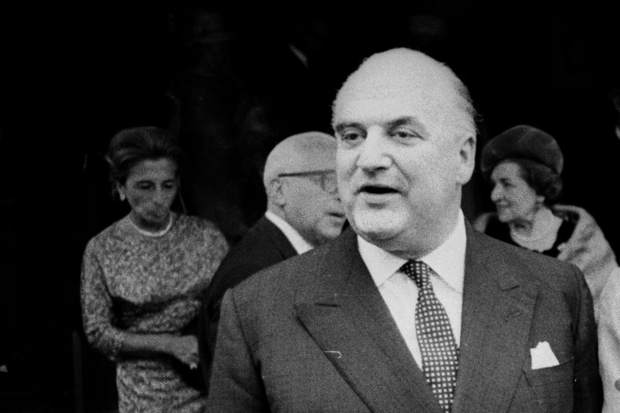My last contact with George Weidenfeld was when I asked him to review a book for The Spectator: a life of Stefan Zweig, who has been enjoying a bit of a moment lately. George didn’t fancy it, but I received – very courteous and friendly, as his communications always were – a postcard declining. You could see why I asked, though: George was the one of the last people alive who actually lived in Zweig’s world – that cultured and cosmopolitan Mitteleuropean moment at the tail end of the Habsburg Empire, smashed up irrevocably by the Nazis.
I first met him a couple of years ago when I was sent to interview him by Tatler. I’ve seldom been so in awe of an interviewee. He arrived in London with a postal order for sixteen shillings and sixpence. He founded Weidenfeld and Nicolson. He was Chaim Weizmann’s chef de cabinet (for this, like Bill Deedes moonlighting as a cabinet minister while still working on the Daily Telegraph’s Peterborough column, he took a sabbatical from publishing). He published Lolita. He was drinking buddies with Pope John Paul II. And – I know he’d probably have regarded this as no big thing, but I was agog – he fought what he guessed was probably the last duel in Vienna before the Anschluss.
The duel involved George – all of about five foot seven, at my guess – seeking out and deliberately insulting the biggest, most Aryan Nazi he could find. ‘Your shoelaces are undone,’ he told Fritz. Realising he’d been tricked, the big man demanded satisfaction – only, on discovering George was Jewish, refused to fight him. So George sought him out and called him a coward in front of his friends. A duel was fought – a no-shit duel, with swords – which went 92 rounds before a draw was declared.
After the Nazis took over, and George fled to the UK, a big brownshirt showed up at George’s mother’s door, asking for George. She told him George was gone – and the brownshirt said he had been the one who fought him: ‘Is there anything I can do for you? Because he was such a brave opponent…’ Still later, in postwar Vienna George looked the guy up – found him hungry and having lost a leg in the war. He ‘plied him with sausages and beer and so forth’.
That conciliatory moment seems to stand for something in him. He was a great bridge-builder, a great introducer, a great oiler of the wheels, a great plier of people with sausages and beer; or, latterly, Champagne and canapés. Much of his life was dedicated to fostering European stability and the survival of the state of Israel – he never wanted what happened in his adult memory to happen again.
He talked in that interview about Torschlusspanik – the lodger’s anxiety about not getting back before the door shuts for curfew – as explaining why, the older he got, the busier he got. Well, the door has shut now. And what a lot he got done.
I asked him, incidentally, whether he’d known Orwell well – he’d worked down the corridor from him in the BBC propaganda department during the war — and he made a bit of a face. Apparently they’d had a slight falling out because George didn’t want to publish one of Orwell’s essays in the magazine he ran. ‘What was the essay?’ I asked. ‘Politics and the English Language,’ said George, cheerfully. Even Homer nods. RIP.







Comments